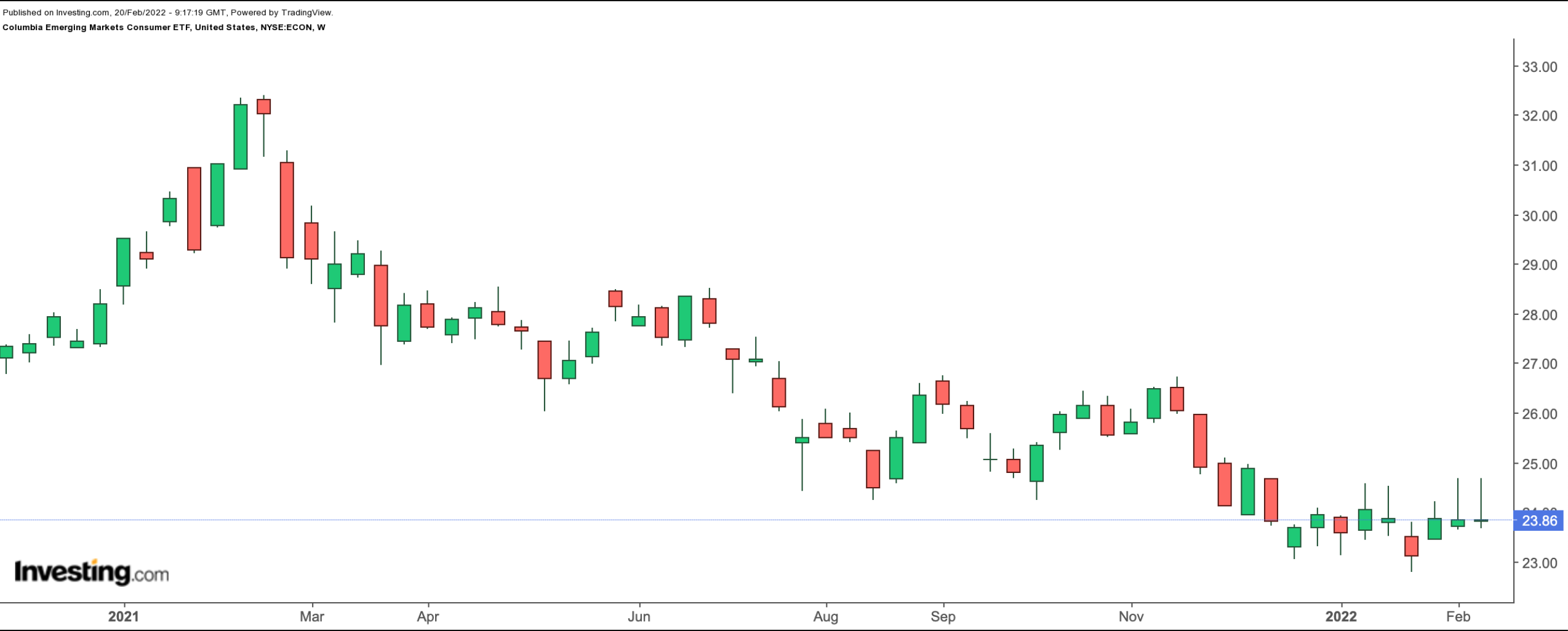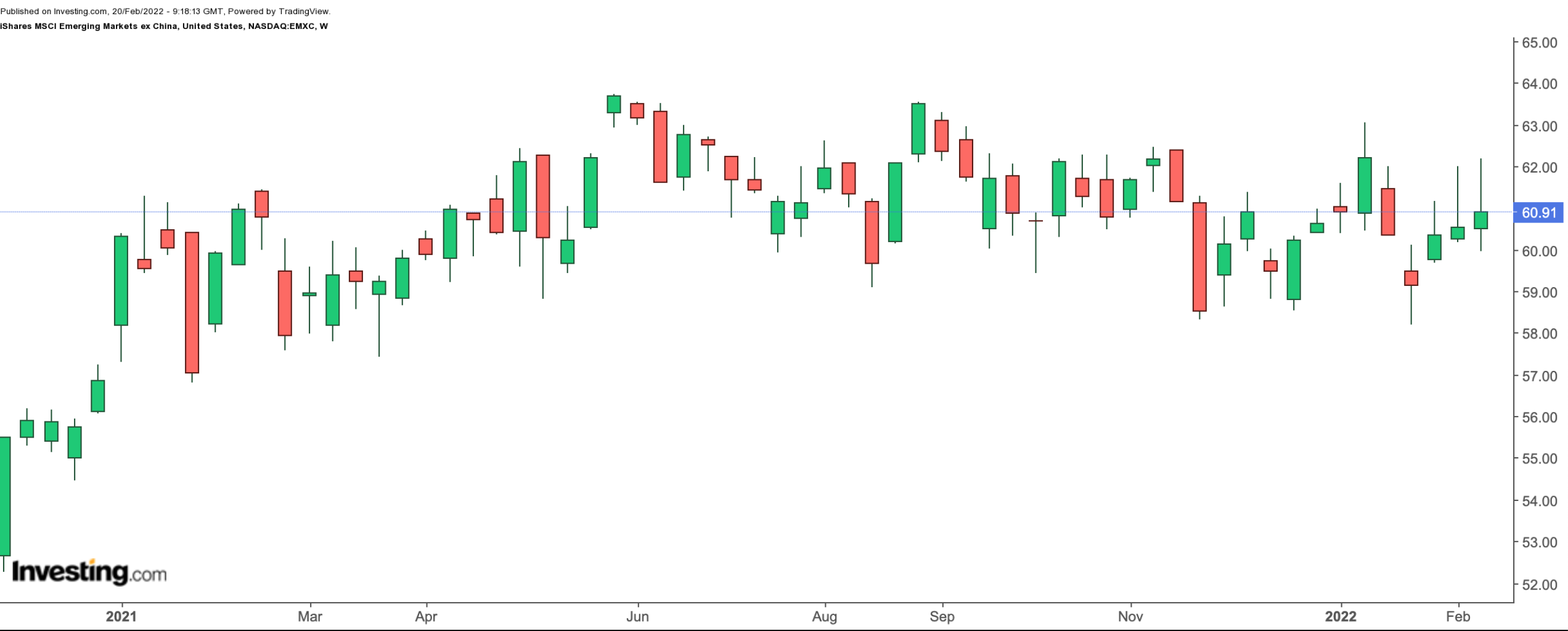Declines on Wall Street, driven by an array of geopolitical and economic jitters, are causing investors to look outside the US for stocks to diversify their portfolios. As a result, shares that provide global exposure, especially into emerging markets (EMs), are in the limelight.
According to Franklin Templeton—a subsidiary of Franklin Resources (NYSE:BEN)—there are compelling reasons to consider EMs. For starters, stock valuations, especially in China, are low. In addition, themes like “Digitalization and decarbonization” might also mean “fresh investment opportunities.”
Therefore, today’s article introduces two EM exchange-traded funds (ETFs) that could help investors find returns outside the US. However, we should remind readers that EM equity markets can be volatile.
For instance, the MSCI Emerging Markets Index ended 2021 down 2.54%. Still, returns had been over 18% in both 2020 and 2019 while the index had declined around 14.5% in 2018.
Understandably, there are also variations among EMs. For example, in 2021, Czech Republic, United Arab Emirates, Saudi Arabia, Mexico and India, and several others, were among the top-performing global equity markets.
On the other hand, investors in many Chinese equities felt the negative effects of the regulatory crackdown of local authorities in a number of growth sectors. As a result, the Shenzhen Composite Index and the Shanghai Composite Index are down about 5.7% and 5% respectively in the past 12 months.
With that information, here are two EM funds that deserve your attention:
1. Columbia Emerging Markets Consumer ETF
- Current Price: $23.86
- 52-Week Range: $22.79 - $32.03
- Dividend Yield: 1.08%
- Expense Ratio: 0.49% per year
Our first fund, the Columbia Emerging Markets Consumer ETF (NYSE:ECON), invests in EM consumer discretionary, consumer staples, and communication services names. The fund was first listed in September 2010.

ECON, which has 61 holdings, tracks the Dow Jones Emerging Markets Consumer Titans 30 Index. The top 10 names account for roughly 40% of net assets of about $136 million.
Communication services and consumer discretionary each account for roughly 36% of the fund, while consumer staples constitute the remaining 28%. Chinese companies dominate the fund with more than 44%, followed by India, Taiwan, Saudi Arabia, Brazil, and Russia.
The leading holdings on the roster include the China-based entertainment conglomerate Tencent Holdings (OTC:TCEHY); Taiwanese telecommunication services provider Chunghwa Telecom (NYSE:CHT); Chinese e-commerce giants Alibaba Group (NYSE:BABA); JD.Com (NASDAQ:JD) and consumer goods name Hindustan Unilever Ltd. (NSE:HLL).
ECON has lost 24.3% over the past 12 months and 0.4% since the start of the year. The decline in 2021 mostly mirrored the losses in Chinese shares. Meanwhile, the fund’s trailing price-to-earnings (P/E) and price-to-book (P/B) ratios stand at 21.64x and 3.40x.
Those investors focusing on the growth potential of EM consumers, fueled by the spending power of the middle-class population, especially in China, should research the fund further.
2. iShares MSCI Emerging Markets ex China ETF
- Current Price: $60.91
- 52-Week Range: $57.43 - $63.74
- Dividend Yield: 1.78%
- Expense Ratio: 0.25% per year
The US is home to the world's largest equity markets, with a market share of over 55%. Next come Japan (7.4%), China (4.4%), and the UK (4.1%). Still, 2021 was a disappointing year for long-term investors in Chinese equities. The main reason was the sell-off in leading shares following “the Chinese government’s intervention in a number of key sectors, including education, e-commerce, property, and gaming.”
Now, investors are hoping the barrage of domestic regulatory moves have mostly ended. Bloomberg has recently reported that domestic state funds have started buying Chinese equities.
However, not all investors might necessarily be ready to include China-based companies in their portfolios. Therefore, our next fund, namely the iShares MSCI Emerging Markets ex China ETF (NASDAQ:EMXC), might appeal to those readers. As the fund's name indicates, it does not invest in Chinese shares.

EMXC, which has 682 holdings, tracks the returns of the MSCI Emerging Markets ex China Index. Since the fund’s inception in August 2017, net assets have reached $2.5 billion.
23.99% of the businesses come from Taiwan, followed by India (18.16%), South Korea (18.03%), Brazil (7.06%), Saudi Arabia (5.59%), and South Africa (5.43%), among others.
Taiwan Semiconductor Manufacturing (NYSE:TSM), Samsung Electronics (KS:005930) (OTC:SSNLF), India-based Reliance Industries (NSE:RELI) and Infosys (NYSE:INFY) are among the leading names in the portfolio.
Year-to-date, the fund is up 0.5%. Similarly, it returned 0.9% in the past 12 months. Trailing P/E and P/B ratios are 19.03x and 2.11x. Interested readers could consider buying the dip in EMXC.
